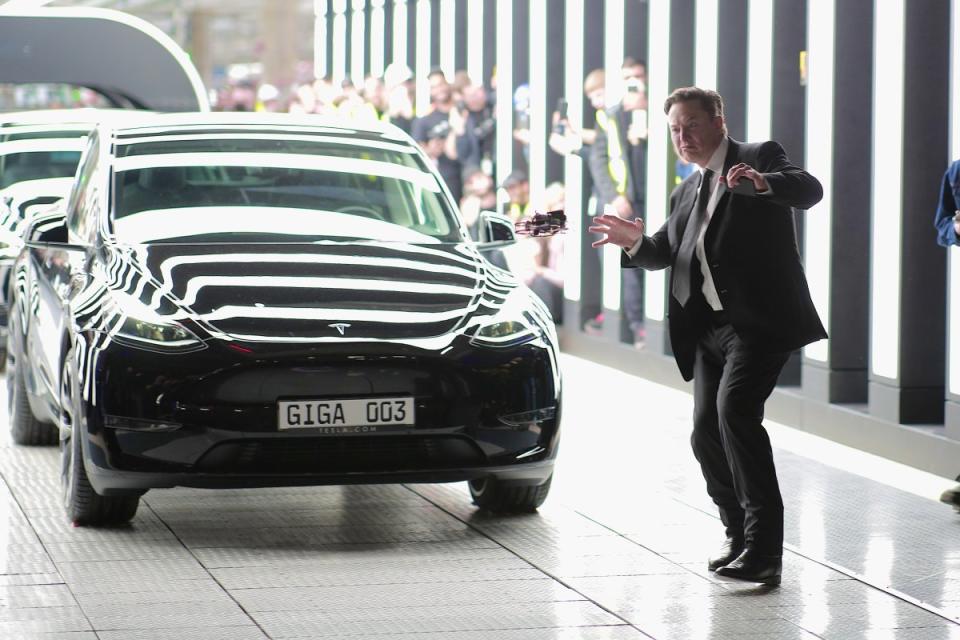Analyst revamps Tesla, Rivian, Nio price targets on electric vehicle demand
When it comes to electric vehicles, the future ain't what it used to be.
Not too long ago, it seemed like EVs would roll into the mainstream, as major automakers announced plans to go all-electric, while startups looked to rev up the competition.
But then the power seemed to drain from the market and several car makers scrubbed or curtailed their EV expansion plans.
Earlier this year Ford (F) said it would reduce production of its F-150 Lightning electric pickup, as demand for EVs has been lower than expected.
And then the company said it had halted shipments of all 2024 model year F-150 Lightning electric pickup trucks on Feb. 9 to "ensure quality."
Automotive News Europe recently reported that sales of plug-in hybrids are growing faster than those of battery-electric vehicles.
The European Automobile Manufacturers Association (ACEA) said sales of plug-in hybrids rose 12% to 72,376 units across the industry in February, compared with a year ago, while sales of battery-electric vehicles rose by 10.3% over the same period.
The changing EV demand trends have caught the eyes of analysts, who are overhauling their price targets.

Pool/Getty Images
Analysts cite near-term EV demand
Tesla (TSLA) , one of the world's biggest EV makers, reduced its car production at its plant in China on Friday, according to a Bloomberg News report, as the company grapples with slow demand and strong competition in the market.
Earlier this month, Telsa told employees at its Shanghai factory to lower the output of both the Model Y sport utility vehicle and Model 3 sedan — the two types it makes in China — by working five days a week instead of the usual 6-1/2 days, Bloomberg said, citing people familiar with the matter.
Related: Tesla stock slumps after startling China decision
And on March 25, shares of cash-strapped startup Fisker (FSR) were halted after the company said talks with a large automaker for a potential deal have collapsed, Reuters reported.
The termination of talks has led Fisker to search for strategic options, including in- or out-of-court restructurings and capital markets transactions, the company said.
Mizuho Financial Group looked at the current EV market and decided to downgrade Tesla, Rivian (RIVN) , and Chinese automaker Nio (NIO) to neutral from buy, citing slowing demand and increasing inventory.
Analyst Vijay Rakesh said he remains constructive on the broader electrical vehicle landscape with the long-term trends to electrification, but he believes that near-term EV demand and tightening liquidity are creating challenges into 2025.
EV inventories were up 92% year-over-year in 2023 and are accelerating, he said.
Mizuho said it now sees 2024 EV growth up 15% year-over-year compared with a previous call for 25% growth. Sales expectations are decelerating faster than expected, Rakesh said.
Rakesh, who slashed his price target on Rivian to $12 from $24, said that he still sees the company well-positioned in the strong SUV/Pickup markets and a push towards profitability, “but headwinds remain from slowing EV demand, challenging execution, and elevated cash burn,” according to Business Insider.
The analyst cut his price target on Nio to $5.50 from $15 as the firm grows more cautious about the company's short-term outlook.
Nio recently lowered its delivery guidance for the March quarter. Rakesh believes Nio anticipates lower deliveries as it increased its focus on its “Le Dao” mass-market brand, which is set to be revealed in May.
Tesla signals acceleration in Full Service Drive
Tesla offered incentives to help move current inventory ahead of its 2024 model-year launches. As a result, gross margins are likely to see some near-term pressure, he said.
Rakesh cut the price target on Tesla from $270 to $195, telling investors that while Tesla remains a global leader with scale/profitability "bar none," moderating growth, China competition, and higher inventory are challenges.
More Automotive:
Electric vehicle maker facing bankruptcy risk negotiates for lifeline
Analysts update Tesla stock outlook after yet another EV price change
Tesla warned investors in January that vehicle-delivery growth rates would be "notably lower" than 2023. CEO Elon Musk said profit margins would improve only after central bank interest-rate cuts.
Oppenheimer analyst Colin Rusch also wrote a research note about Tesla on Monday.
With Tesla announcing planned price increases and reports surfacing about moderated production in China, Rusch said he believes the company is working to deliver as many vehicles as possible before the end of the quarter and managing the supply and demand balance as it shifts toward maximizing value capture per vehicle and away from unit growth.
Musk has reportedly told employees to install and demo Full Self-Driving Beta for every customer taking delivery in North America, according to Electrek.
"Almost no one actually realizes how well (supervised) FSD actually works," he said in an email to employees.
Rusch said Tesla is signaling an acceleration in FSD development after major investments in compute power and a wider rollout of V12 FSD, allowing for accelerated system training with real-world data.
The analyst believes the company is setting the stage for increased software-driven revenue growth as it prepares to launch the Model 2, which is reportedly slated to go into production next year.
As Oppenheimer trims estimates, the firm thinks the first quarter report could lead to a final near-term cut on Tesla's estimates.
Related: Veteran fund manager picks favorite stocks for 2024
